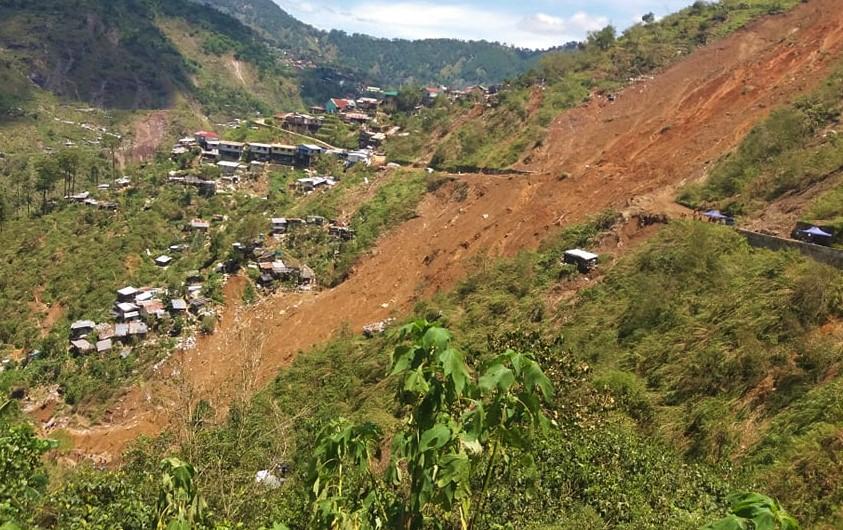 BAGUIO CITY — Various government agencies in Cordillera are laying down plans to give livelihood opportunities to families affected by the fatal landslide in Itogon, Benguet due to Typhoon Ompong to help them get up from the tragedy.
BAGUIO CITY — Various government agencies in Cordillera are laying down plans to give livelihood opportunities to families affected by the fatal landslide in Itogon, Benguet due to Typhoon Ompong to help them get up from the tragedy.
In a meeting of the Regional Development Council’s economic development committee on Monday, Freda Gawisan, provincial officer of the Department of Trade and Industry (DTI) in Baguio-Benguet, said the agency has so far profiled and interviewed 95 families who sought livelihood assistance.
Gawisan said more than half of these locals want to get into farming, the rest into hog production, retailing or sari-sari store, poultry raising, vegetable trading, and weaving as alternative livelihood.
Dozens of Itogon residents, mostly miners and contractual laborers from nearby provinces who wanted to earn more money, perished in a major landslide in Barangay Ucab at the height of Typhoon Ompong middle of September, forcing their families to vacate their homes and leaving the mining village a “no man’s land”.
Gawisan said although some of the families from Itogon had availed of the “Balik Probinsiya” (back to the province) program of the Department of Social Welfare and Development (DSWD), the government will still track them in their hometowns to make sure they get assistance.
Gawisan said the DTI will establish a “Negosyo Center” in Itogon town, where business counseling will be conducted, to prepare the families for their transformation as small entrepreneurs.
“There will also be a provison of facilities and equipment for the beneficiaries,” she said, adding the DTI will also conduct livelihood forums and “diskwento” (savings) caravans in the town.

“The President has given a directive through Political Adviser Secretary Francis Tolentino that all agencies in the region with mandate on livelihood and economic development and entrepreneurship to converge and come up with a short term plan leading to long and sustainable livelihood program for the victims,” DTI-Cordillera Regional Director Myrna Pablo said.
Various government agencies in the region will work hand in hand to bring the government’s services closer to the victims, Pablo told the Philippine News Agency (PNA).
A representative of the Department of Agriculture in the regional economic meeting said the victims can avail of the department’s Production Loan Easy Access (PLEA) program for agricultural ventures.
PLEA is a loan facility designed to address the financial needs of the marginalized and small farmers. It is being implemented by the Agricultural Credit Policy Council (ACPC), an attached agency of the DA.
The Technical Education and Skills Development Authority (TESDA), meanwhile, said 119 victims from the town have registered with the agency and expressed desire to acquire skills on automotive, welding, heavy equipment operator, beauty care, and driving.
Earlier, Acting TESDA Regional Director Manuel Wong told the PNA that the agency might give scholarships to those interested to be trained in any TESDA accredited institutions.
For its part, the Philippine Economic Zone Authority (PEZA) in Baguio is open to employing qualified victims as part of its Corporate Social Responsibility (CSR) program, PEZA-Baguio administrator Joey Mipa said.
Meanwhile, DSWD representatives said they have sufficient supply of food items for the victims, but are facing shortage in non-food items, such as undergarments, hygiene kits, and baby products.
In a meeting with Tolentino last week, DSWD-Cordillera Acting Regional Director Janet Armas said the DSWD is looking at applying its cash-for-work program with some of the affected families, considering many of them have opted to go back to their original provinces.
“We have a system of tracking and we will still extend to them the same assistance even if they are already in their provinces,” Armas said.
He said the DSWD will join resources with the Department of Labor and Employment in Cordillera to complete the one-month cash-for-work program.
Department of Tourism said it will provide trainings for the victims, like in tour-guiding and product development, as additional source of income.
At the same time, the National Commission on Indigenous Peoples in Cordillera will also provide the victims livelihood-related courses, NCIP-Cordillera Regional Director Ronald Calde said. (Pamela Mariz Geminiano/PNA)
